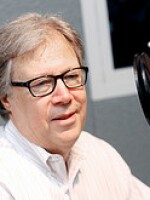This really is an extraordinary piece of music. If you can see your way, you should try to attend.
I was talking to Rick Coffey the other day about Mendelssohn’s great oratorio “Elijah.”
Rick, of course, is the music director of the , and he will lead his group, along with the , in a performance of “Elijah” Thursday night, April 14, at The Bushnell.
“Elijah” is regarded as one of the bedrock choral/orchestral masterpieces, in the company of Handel’s “Messiah,” or the Bach B-minor Mass, or the Requiems of Verdi and Brahms and Faure.
Oddly, though, neither Rick nor I could remember a performance of the piece at the Bushnell. I couldn't find any evidence of it having been done at the hall in earlier days, either. So, in addition to other distinctions, Thursday’s presentation will evidently be a historic first.
It’s funny how memory works with respect to music. I’ve only heard “Elijah” live in concert a couple of times in my life. I like and admire the piece very much. ( is on my short list of Most Underrated composers, a list that itself might be a good topic for a future blog.)

But the thing about this piece that sticks in my mind is a moment that happened more than a half a century ago, when I was a kid, in my hometown of Schenectady, New York.
My family belonged to a mainline Protestant church in that city’s old “stockade,” district, so named because the early settlers, mostly Dutch, had indeed erected a wooden stockade to protect themselves from enemies.
One weekday night – I can’t recall why I would have been there – I wandered into the sanctuary, where the choir was rehearsing. The lights in the huge vaulted space were atmospherically dim, and the singers were singing what seemed to me about the most strikingly beautiful piece I had ever heard.
I later learned this short piece was a segment from “Elijah” -- “Cast Thy Burden Upon the Lord.” I believe that segment was written just as a quartet for the four vocal soloists, but in this case it had been arranged for the full choir.
I can still remember the quiet, almost unearthly sound of that brief encounter, and the impression it made on me.
There’s no real point to this story except (1) to say, again, that musical memory can be a powerful faculty, and (2) this really is an extraordinary piece of music. If you can see your way, you should try to attend. For many, if not most, this will literally be a once in a lifetime experience.
Here's .
In Memoriam:
We’ve lost two people in recent days who had an indelible impact on the musical life of this community and this region:
Violinist passed last week. It would be hard to think of a more active, visible presence in the city’s musical life than Bernie.

Most folks around here will recall him best as the longtime concertmaster of the Hartford Symphony Orchestra. He held that position for 32 years, until his retirement in 2001. All told, Bernie played in the HSO for an even 50 years, an almost unimaginable run that began when he was 18.
He was also the conductor of the Greater Hartford Youth Orchestra for half a century, and taught for decades at The Hartt School, where he had earned his Bachelor’s and Master’s degrees.
Bernie Lurie was 82.

I was saddened to learn, a few days earlier, that had died in Ohio at the age of 84. Don, a composer by trade, came to Hartford in the 1970s to chair the composition department at The Hartt School. A few years later, in 1977, he became dean of the school, and held that position for eleven years. For several of those years, he gamely weathered the additional challenge of being my boss.
Don was a charming, cosmopolitan man. He had lived in Paris in the 50s and 60s, where he was a central player in that city’s legendarily lively contemporary music scene. He had excellent stories about his teacher, Nadia Boulanger, and about many of the titans of contemporary music, including Boulez, Bernstein and Gunther Schuller.
After his years at Hartt, Don became dean of the College of the Arts at the Ohio State University.
.
Reach Steve Metcalf at spmetcalf55@gmail.com.


